- Home
- Kim Newman
The Night Mayor Page 11
The Night Mayor Read online
Page 11
Carradine and I sauntered across the dance floor. Zorro leaped through an enormous fountain, but tripped and fell face first into the water. Everyone within six feet was soaked. A scythe-toting Death turned round and screamed furiously at the bandit chief. A monkey in a fringed vest, a plumed sombrero tied to its head, shot into my legs, pulled at my trench coat and showed off his teeth. Carradine kicked it out of the way.
The crowds parted. An oriental girl dressed as a matador wrenched off her domino and threw herself at me. Our teeth gritted as we kissed.
‘Hiya, American sojer johnny,’ she cooed. ‘You got my missing knife?’
‘Hi, Anna, could you…’
But she was gone before I could finish asking her for help, borne away by three identically dressed musketeers, waving her whip in the air, and lost in the crowds again. I saw Zeppo Marx sitting glumly, out of the action as usual, looking at his watch, ignoring the festivities.
The wrestlers were even more enormous up close.
‘We need a diversion,’ I shouted over the cacophony. Carradine nodded, but we didn’t have an idea for one.
However, just then the dragon’s head came off. Underneath had been a midget sitting on the shoulders of a tall black man. The midget was smoking a cigar and had a tommy gun. He fired into the air, and a chandelier crashed down. Everybody screamed and tried to get out of range. The wrestlers moved as a team towards the troublemakers, and we circled round behind them. Carradine picked up a sword a Sir Lancelot had dropped, and we ran up the steps towards Macready’s lair. The gun went off again, and chips of marble flew from the steps ahead of us.
We hit the doors at a run, and burst through.
It had, of course, been too easy.
In Macready’s large private office, guns were levelled at us. The gambling king stood to one side, wrapped in a black kimono, a white scarf knotted at his throat. The Nazis had left, but there was a huge portrait of der Fuhrer himself, Anton Diffring, over the desk.
‘Mr Quick,’ he rasped, ‘welcome to Noir et Blanc. This gentleman is Captain of Detectives Barton MacLane. He has been most anxious to meet you. And these people with guns are National Guardsmen. I would appreciate it if you gave up without a fight. We’ve only just redecorated.’
MacLane, a flab-faced, mean-eyed boxer type, chomped a cigar. ‘You’re unner arrest, flatfoot.’
Slowly, I took my fists out of my pockets and opened them empty. I spread them in benediction, and reached up for some air.
‘I surrender,’ I said.
‘Whaddya mean, ya bum,’ shouted MacLane, ‘ya resistin’ arrest.’
The guns came up, the safeties came off. Then the action started.
15
Something popped inside John Carradine’s head, and he cartwheeled across the room, dodging bullets. He collided with the Guardsmen, and they went down in a tangle.
Struggling to his feet, he realised he was waving his sword. Things were happening too fast to keep up with. The voice in his head, Yggdrasil, told him what to do. He wasn’t obliged to follow his own scenario any more, but he knew he would have to obey the voice now. This was a crucial stage in the main plot.
Macready raised his stick, cruel mouth curving like a second scar, and a foot-long blade sprang out. The gambling king slashed downwards and, although he stepped back, Carradine could feel the cold trace of the knifepoint parting his clothes, drawing a slice down his skinny ribs. Before Macready could thrust, Carradine parried perfectly. Sparks flew.
Macready unbelted his kimono, Carradine threw off his cloak. They circled each other, making probing moves. Carradine felt he had the measure of his enemy. The two men fought in the centre of the office. Carradine hacked at the other man’s stick, and a length of wood flew away. But there was a steel core, and Macready fenced on, undeterred. He was the more skilled swordsman. With a lucky stroke, Carradine gave his opponent a cut on his left cheek. If it healed, he would have matching scars now. Macready wiped his wound with a sleeve, and radiated hatred.
‘Die, scarecrow popinjay!’
Everyone else in the room was crowded against the walls, out of range of the swinging swords. Carradine vaulted up on the desk and made moves around Macready’s head, while Macready struck at Carradine’s dancing legs, missing repeatedly. Carradine leaped and the two men went down, grappling, weapons lost. Macready pushed Carradine’s chin upwards, fingers digging into his throat. Locked together, they rolled across the carpet. With Macready under him, Carradine felt his enemy go rigid, then limp.
Macready had rolled onto his own blade.
Carradine stood up, bleeding from several cuts. He touched his side, and his hand came away bloody.
‘Look, Richie. It’s… red!’
Richie Quick took his hat off and stared. Carradine knew that something momentous was happening. The voice congratulated him.
‘Bring him down,’ sneered the policeman, MacLane.
‘No,’ shouted Richie.
The guns went off again, and Carradine felt the thumps across his chest.
Finally assured that he had been truly alive, he died.
PART III
LADY IN THE DARK
16
Susan could have sworn the bullethole in Cook’s forehead turned into an eye and winked at her. It was possible. In Dreams, anything was possible. She should know that.
Still rattled, she walked away from the cab, leaving the remains in the front seat. The taxi hummed in the road, motor idling, meter ticking over. Traffic passed it by. Susan had tagged a uniformed cop on the beat in the distance, and guessed she wouldn’t want to talk to him about the corpse. She was new in the City. She didn’t have any friends yet.
Cook had been Daine’s way of welcoming her, she thought. Just one of those casual I-can-do-anything-I-want-any-time-I-want-and-make-you-like-it gestures so beloved of megalomaniacs, mass murderers and the Gunmint. But if the news item in the Inquirer was the literal truth, Daine was dead. That wasn’t likely. Although his brainwaves were doing some interesting things on the printouts, Dr Groome had monitored no major trauma. Susan suspected her quarry had decided to stop wearing his own face for a while, so he could deal with his guests. And Tom Tunney must have been absurdly easy to deal with. In a way, it was perfect: faced with a would-be assassin, Daine had had himself killed and set up his opponent to take the consequences.
She was determined to be less biddable. If she could find somewhere dry, she would be able to go on the offensive. If the psychs were on line, Daine should be losing some of his control. Even if he had been gulped down by the City, Tunney should be making some difference, feeding in his own amendments. And Susan thought she could transform the entire environment once she got a grip on it. After all, she had had more practice at manufacturing realities than Daine. Porno Dreams were of a notoriously low standard, blurry beyond the bedroom, giving the dreamer the feeling he was dybbukking a deep-sea diving suit rather than a human body.
She stopped at a newsstand. It was different from the one where she had bought her extra, but it was also manned by Mickey Rooney. He must be a fixture of the cliché. Without pausing for wisecracks, she picked up a cheap map. Down the street a block or two, she found a spot under a grocer’s awning where she could pore over the map. It unfolded from a slim oblong into a sheet-sized square that flapped and fought in the wind and didn’t bear much resemblance to what she’d seen of the City so far. It was particularly vague around the edges. Susan intuited that the Dream was evolving fast, recasting its inhabitants, twisting its externals.
Used to giving in to Dreams, she was learning how to fight back. This was no serial hallucination, in which the dreamer was trapped in the viewpoints of a succession of similies. Here, everyone who entered was free to be Dreamer. Daine needed that flexibility, but he must have been aware of the risks. He had been ready for Tunney. He thought he was ready for her.
Beyond the curtain of rain, strange forms moved. Susan wished Daine would show himself so they could stru
ggle mind to mind and settle this thing. But the City Father would be out there in his maze, sending his cat’s paws into battle, wearing down his enemies, squeezing their minds. In particular, she expected perils out of the flatties – murderous hoodlums, crooked cops, knife-wielding janitors – but she knew that if he stretched his mind a touch, Daine could make anything or anyone in the City into a weapon. Here, she could as easily be killed by Shirley Temple, Elmer Fudd or Lou Costello as by Jack Palance, Freddy Krueger or Anthony Perkins.
She tried to find herself on the map, but the printed boulevards and blocks writhed whenever she looked up at the street, making new patterns. Susan saw Escher mazes and Mobius strips. Annoyed, she crumpled the map and threw it into the gutter. It twisted into an origami boat and sailed off towards a sewer inlet. She heard an echo of the pirates’ chorus from The Sea Hawk in the rain.
The awning flew back with a chainsaw rasp, and a cascade of rainwater came down on her head. The raincoat kept most of it off, but her hair got a soaking even under her hood. She thought it dry, and it was, but she could not make a dent in the downpour itself. She reached out across the street and tried to get an idea of the shape of a building she could dimly see. Its dimensions were easy to get a hold on. A brown stone, three storeys tall, derelict, with a squared-off roof, an arch of chimneys, a child’s picture arrangement of windows and an imposing front doorway. The windows were gone entirely or boarded over. She closed her eyes, but could still see the building.
In her mind, she changed the picture. She stripped away the outer shell brick by brick, and massaged the essence of the structure, fashioning a gothic cathedral. Spires raised to the skies, lightning flashing around them, and windows filled with stained glass. The cathedral spread, squashing the buildings on either side like plasticine, then absorbing them entirely. Angels danced in the air and settled reverently into their alcoves. Paving stones stood up and were drawn into the new building.
The process was silent. Susan opened her eyes, and surveyed her handiwork. It was crude, a trifle unfinished and unformed – in any other Dream, she would have researched the externals rather than built on a whim – but it was what she wanted. She willed the great wooden doors open, and crossed the street. Inside, it would at least be dry.
She stepped through the doors, and found herself in total darkness. She had forgotten to imagine an interior. An easy mistake. She was used to fashioning scenery for the background. In Dreams, you always passed by more houses than you explored. There was no rain in the darkness, and she could make even its sound go away by concentrating hard for a few moments. In the darkness, the Dream was raw and formless. She made herself a cathedral, not quite in the spirit of the exterior, but roomy enough. The vast building gave her a feeling of power. Although she knew it must be tiny in comparison with the rest of the City, it felt enormous, and it was the feelings that counted. She made herself a pump organ, and Dreamed up a man to play it.
Lord Roger Marshaller, the most nearly decent of Vanessa Vail’s suitors, emerged from the sacristy and walked across the aisle to the organ. Susan had combined the faces of several older men – a teacher, a holomeister, some singers – she had been smitten with between the ages of nine and twelve, then weathered them to make her composite even more appealing. Lord Roger was supposed to be a fantasy for bored romantics. His laughing blue eyes had steely grey flecks in them, and he was wont to pass huge, yet sensitive, fingers through his leonine mane of silver-grey hair. She had Dreamed Lord Roger as a former surgeon, still brooding because of his inability to save the life of his only child. He was also a Nobel laureate, a leading ice sculptor and a master horseman. Now, she gave him an unmatched musical talent too.
She sat down, unnoticed, in a pew, while Lord Roger limbered up. He played scales, flexing his surgeon-sculptor’s hands. Then, he launched into ‘Barbara Allen’.
In Scarlet Town, where I was born
There is a fair maid dwellin’
Made every lad cry “lack-a-day”
For the love of Barbara Allen…
Susan realised her mistake. A small jazz combo had popped out of nowhere and were arrayed around Lord Roger. A vocalist – Annie Belladonna, the teenage xenobiologist heroine of The Sewer Thing – enunciated the lyrics in Rosemary Clooney’s voice. The music was sucking her in…
Twas in the merry month of May,
When green buds they were swellin’
And on his death-bed Sweet William lay
For the love of Barbara Allen…
The roof began to fade. Susan felt the rain come in. The music was louder in her mind, louder than anything. More and more instruments took up the melody, drowning out the frail lyric line. A choir appeared behind the altar, offering peculiar harmonies. The children opened too-large mouths in otherwise blank faces. The improvisation stretched on, drawing Susan into it, locking into set patterns of repetition which were as fascinating as the gaze of a cobra. The number might never end, and Susan would be caught for ever.
With a painful effort, she banished the music, and the cathedral fell silent. Annie Belladonna, the musicians, the choir, all were gone. Lord Roger slumped over the organ keyboard, the life whipped out of him. She gave it back, but he could only move jerkily, like an unwieldy puppet. Susan made him climb down from the organ and walk over to her, but his uncoordinated limbs reminded her too much of the zombies in Corin Santangelo’s horror Dream Eyeball Gougers from Italy. She didn’t want to see what she had done to his craggy yet handsome face, so she made him go away. He whisped out of his clothes, which hung man-shaped in the air for a second and then drifted to the floor.
She would have to be careful about her overconfidence binges.
Outside the cathedral, there would be a chauffeur-driven skimmer waiting for her. A sports model, with an andrew to pilot it.
She was right, only the anachronisms she tried to wedge into Daine’s Dream didn’t take. The skimmer was a long, black automobile. And the chauffeur was a liveried war veteran with a steel face and leather hands. That would just have to do.
She got into the back of the car, and was glad to see her unconscious had had the foresight to include a bar.
She poured herself a shot and knocked it back. It stung the back of her throat and fired in her belly. Shaking her head at the kick, she lashed out at the whole row of stores opposite her cathedral and dispelled them to dust. Gushers rose from disconnected water pipes, and the Dream matter sludged instantly.
Without being told, the chauffeur drove away. She was back in a vehicle again, but this time it was hers. She wondered how much control she had over the chauffeur. After Lord Roger, she intended to be careful. You couldn’t just make and unmake people at will without working at it.
Also, she would have to find Daine. Best to start at the top.
‘City Hall,’ she said. ‘I have to see a mayor.’
17
Steelface knew how to get to City Hall. Susan suspected Daine was making it easy. He thought he could mindblast her as simply as he had put Tunney out of the picture. And, he was probably curious about her. She mightn’t be much, but in the self-awareness and independence stakes she was the only girl in town. This might be his idea of an escape, but in Daine’s position she thought she’d go zooidal. She imagined a lifetime among her own Dreamed creations, knowing exactly what they would say next, exactly what was around every corner. No matter how vast a universe he made, Daine would still be trapped by the limits of his own imagination. He was probably far gone enough not to realise yet that he had jumped from one box into a smaller one.
All roads probably led to City Hall. Her chauffeur got her there with the minimum of distraction. There weren’t any incidents to get in the way. No car chases or police roadblocks.
Insofar as the City had a business and commercial district, this was it. There were election posters up for the mayoral race. James Stewart was running against the incumbent, Brian Donlevy. Neither of them appeared to represent any particular party, and the e
lection was being fought entirely on personalities. Stewart’s slogan was ‘War on Graft’, Donlevy’s ‘Doing Things the Way They’ve Always Been Done’. Susan knew Stewart would win the election but never take office. That was how the story always goes: the young reformer wins in the end, but by the next picture the corrupt machine politicians are still in power. She wondered if Jimmy ever got tired of the cycle. She kept seeing copperplate graffiti on Stewart’s posters, ‘You can’t fight City Hall.’ Things weren’t all that different back in the real world, she thought.
The City’s administrative centre was like a giant-scaled village green, with three imposing municipal erections boxing it in. City Hall, Police Headquarters and the Metro-Goldwyn-Mayer Building. City Square was a cheerless park, with arrangements of black, white and grey flowers in beds, grey stretches of grass, and a monumental, black, floodlit statue of Truro Daine dressed as a Roman emperor, fiddle tucked under his chin, bow poised to saw down.
Susan had her chauffeur draw into a space beside City Hall marked RESERVED, and got out of the car. The square was empty, except for a pair of winos sleeping it off under the statue. She looked up at the statue and laughed. The black brows knit, and solid silver laurels bobbed. Like many great villains, Daine must have no conception of how ludicrous he appeared much of the time.
‘Are you really in there, Daine?’ she shouted.
Gigantic arms moved, and music was shaken from the stone violin. ‘The Devil’s Trill’ by Tartini. More delusions of grandeur. Although the music was animated, only the arms moved. The face was frozen now, and the rest of the body was stone dead.
Over the shriek of the tune, Susan asked a question. ‘Daine, do you know anything about Japanese monster flatties?’
She sat cross-legged on the grass and reached out to the bay. Casting her mind deep into the black waters, she created a whirlpool. It started as a funnelling current the size of a sea horse, then lengthened, sucking in a core of air. She made that air solid, and drew in stuff from the water and clouds of spinning gravel. Daine had made the bottom of his sea loose, like a big fishtank. She imagined a musculature, a skeleton, a hide, pumping organs, glowing eyes. As her creation grew in strength, so she felt her own on the rise. Her upper arms began to swell, stretching tight the fabric of her suit. She caught it in time, and had them dwindle a little. She couldn’t afford a Hulk-out now.

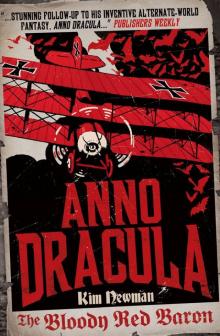 The Bloody Red Baron
The Bloody Red Baron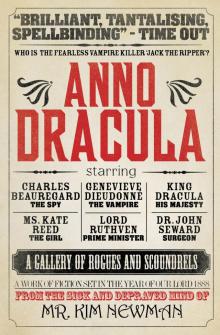 Anno Dracula
Anno Dracula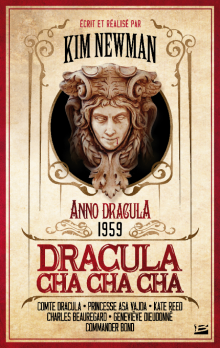 Dracula Cha Cha Cha
Dracula Cha Cha Cha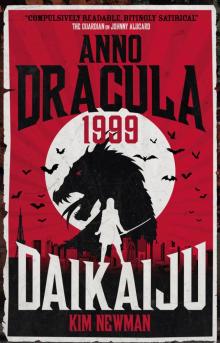 Anno Dracula 1999
Anno Dracula 1999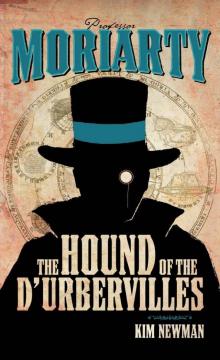 Moriarty: The Hound of the D'Urbervilles
Moriarty: The Hound of the D'Urbervilles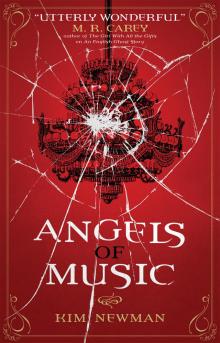 Angels of Music
Angels of Music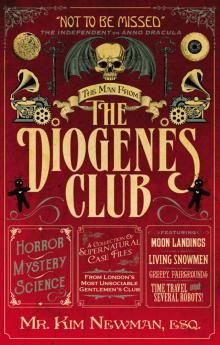 The Man From the Diogenes Club
The Man From the Diogenes Club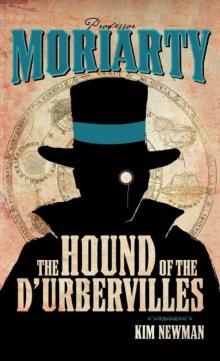 Professor Moriarty: The Hound Of The D’urbervilles
Professor Moriarty: The Hound Of The D’urbervilles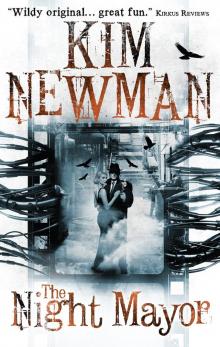 The Night Mayor
The Night Mayor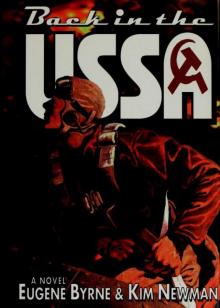 Back in the USSA
Back in the USSA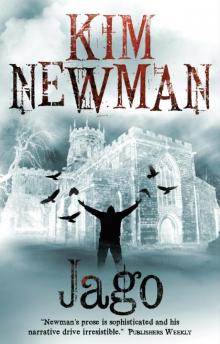 Jago
Jago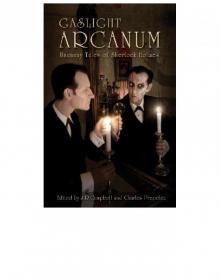 Gaslight Arcanum: Uncanny Tales of Sherlock Holmes
Gaslight Arcanum: Uncanny Tales of Sherlock Holmes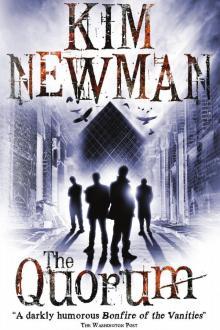 The Quorum
The Quorum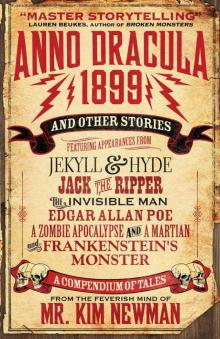 Anno Dracula 1899 and Other Stories
Anno Dracula 1899 and Other Stories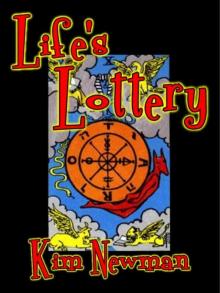 Life's Lottery
Life's Lottery The Secrets of Drearcliff Grange School
The Secrets of Drearcliff Grange School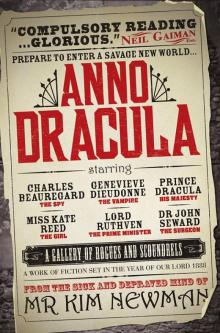 Anno Dracula ad-1
Anno Dracula ad-1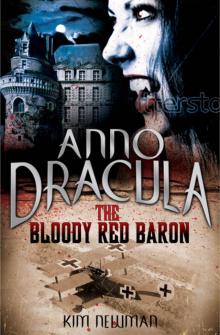 The Bloody Red Baron: 1918 ad-2
The Bloody Red Baron: 1918 ad-2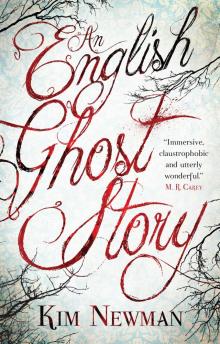 An English Ghost Story
An English Ghost Story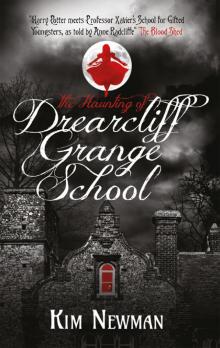 The Haunting of Drearcliff Grange School
The Haunting of Drearcliff Grange School The Other Side of Midnight
The Other Side of Midnight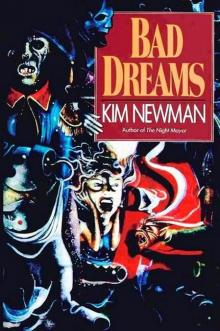 Bad Dreams
Bad Dreams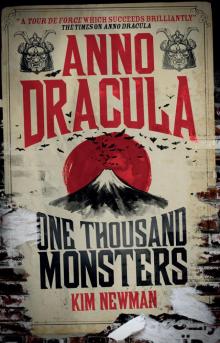 Anno Dracula--One Thousand Monsters
Anno Dracula--One Thousand Monsters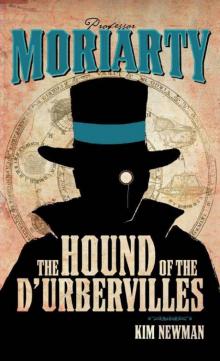 The Hound Of The D’urbervilles
The Hound Of The D’urbervilles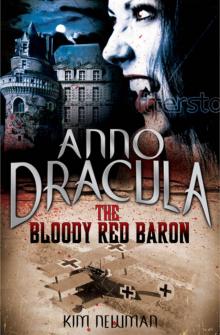 The Bloody Red Baron: Anno Dracula 1918
The Bloody Red Baron: Anno Dracula 1918